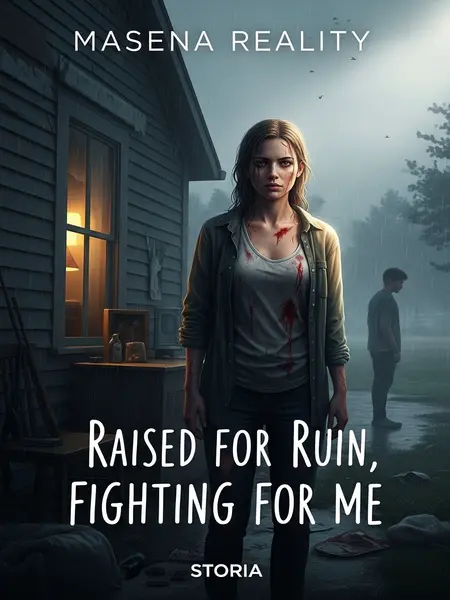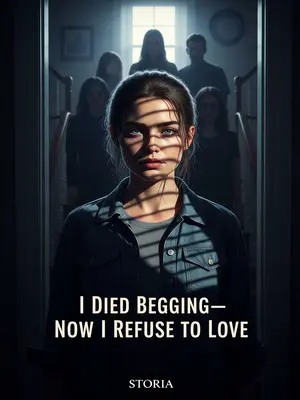Chapter 1: Never the Pearl
When you get a stepmom, sometimes your whole world shifts. But for me, it wasn’t just a story—this is my life.
I remember the first time my stepmom ever talked about family. She said, “Girls with brothers are cherished, like pearls in the palm of your hand.” But I was never a pearl, never something precious held high—I was just dirt underfoot, weighed down by a thousand burdens, barely able to breathe. Her words echoed in my ears for years. They were like a lullaby, but one meant for someone else’s daughter—not me. Sometimes I’d think, Maybe I’m just not the right kind of girl.
Sometimes, I’d stare at my reflection in the bathroom mirror, trying to picture myself as that treasured pearl. But all I ever saw was a girl with tired eyes, hands calloused from chores, and a heart that already knew too much about loneliness. I’d stare, searching for that pearl, but all I ever saw was a girl with tired eyes, worn down by the world.
I was born on the wrong side of luck, always the subject of gossip. When my mom gave birth to me, she suffered a rare complication. Even with all their money, her life couldn't be saved. I was born on a muggy July night, and my birth cost my mother her life. Folks in Maple Heights said I had cursed luck, that I brought nothing but misfortune.
Even now, I can hear the whispers on sticky summer nights—neighbors fanning themselves on their porches, trading stories over the hum of cicadas: “That Mariah girl, she’s the reason her mama’s gone.” I grew up half-believing them, half-hoping there was something else to blame. My chest would tighten every time I heard my name drift through the dark.
In a way, I was lucky... My parents had no real feelings for each other, so my dad didn’t blame me or send me away. Later, my dad brought home a stepmom. She had a son five years older than me, and she was pregnant again—with my dad’s child. The neighbors came to congratulate us, using a saying common in some families: “Now it’s really a complete family, with both a son and a daughter.”
I remember standing in the kitchen, sticky with summer heat, watching them shake my dad’s hand and slap his back, their voices a little too loud, like they were trying to convince themselves. I kept my head down. Counted the tiles on the floor.
My stepmom smiled awkwardly. “It’s my husband who has both a son and a daughter.”
She said it with a laugh that didn’t quite reach her eyes, her hand resting protectively on her belly, as if she was already bracing herself for what was to come.
A few months later, she gave birth to my younger brother. I thought I was part of this family too, that I would be loved the same. But in reality, it wasn’t like that at all. I remember sitting on the porch, listening to the sounds of a new baby crying, wishing someone would open the door and call my name.
I’d peek into the nursery, watching her rock my baby brother, humming lullabies I’d never heard. Sometimes, I’d imagine her arms around me, just once. But the door always stayed closed.
My older brother and younger brother were both my stepmom’s own kids, and everything always went smoothly for them. I never dared to compete with my brothers for anything. My stepmom always said, “Your brother is sensible, so it must be your fault. Your younger brother is still little, you can’t always pick on him.” Sometimes I’d wonder, Is it always my fault? But I kept quiet.
There were days I’d bite my tongue so hard it hurt, just to keep from arguing. Silence was safer. I learned early: in our house, not speaking up was the only way to survive.
Whenever the family bought fried chicken, Mom would divide it up. There were two drumsticks—one for my older brother, one for my younger brother. The scraps at the bottom of the pot were for me. “Mom knows you love chicken soup, it has the most flavor.”
Sometimes, I’d watch the oil glisten on my brothers’ plates, the smell making my stomach ache. I’d force a smile. Nod. Pretend the soup was my favorite part. Swirl the wilted greens with my spoon and try not to look jealous.
Later, I started school. My brothers could sleep in past seven, but I had to get up before dawn. My stepmom said, “No use in girls going to school—being sweet and well-behaved is a woman’s greatest virtue. Just like your name, Mariah.”
I’d sit at my desk in the early dark, watching the sun creep over the horizon, practicing my cursive by the weak light. Maybe being good meant never wanting anything for myself.
I had to cut grass for the goats at the cemetery behind town—there was more grass there, and it saved ten minutes. (In our town, cemetery grass was used for feed because it grew thick and fast, and no one cared if you took it.) Pig feed couldn’t be too rich in cornmeal—it was a waste of money. My older brother used to secretly help me, but after my stepmom caught him and hit him, saying he was siding with an outsider, I was left on my own.
The cemetery always felt heavy and quiet, the air thick with dew and ghosts of memories I didn’t have. I’d move quickly, heart pounding, sometimes humming just to break the silence. I missed my brother’s quiet company. But I understood why he stayed away.
Most kids love birthdays, but I dreaded mine. My birthday was the anniversary of my mother’s death. Right in the middle of July. Ironic, huh? My older brother and I had birthdays only a week apart, so I would tag along with his. My stepmom would buy a cake; my brother would make a wish and blow out the candles. I would secretly save those candles, light them again when no one was around, and blow them out by myself.
I’d sit on the back steps, lighting each candle one by one, whispering wishes into the dark. Sometimes, I wished for a real family. Sometimes, just for someone to notice me.
Later, on my mother’s death anniversary, my stepmom wouldn’t let my dad go to the cemetery. She said visiting graves during the summer brought bad luck to the whole family—a superstition she insisted on. I cried and resisted. My dad even took a belt to me: “How did I end up with such a selfish kid as you? Not only did you kill your mother, now you want to harm the whole family? Do we owe you, you little troublemaker?” (In some families, ‘debt-collector’ is what they call a child who brings misfortune.)
His words stung worse than the belt. I pressed my face into my pillow that night, wishing I could disappear. The house seemed colder after that. Like even the walls were angry with me.
It was still my stepmom who stopped him. I never really understood what they were playing at. I never really knew if I was truly born under a bad star.
Sometimes, I’d lie awake, listening to the creaks of the old house, wondering if fate really had it out for me—or if I was just unlucky enough to be born in the wrong story.
When I cut grass at the cemetery, I always felt like I could see my mother. Before sunrise, with the mist swirling around, she would hold me tightly in her arms. In those moments, I would think: if only I could go with my mother, how I wished I could.
The mist felt like her hands on my shoulders, soft and cool. I’d close my eyes and pretend she was there, humming a lullaby only I could hear. The ache in my chest would ease. Just a little.
Sunlight always ruined my visits with her. I didn’t dare feel resentful. I didn’t dare fight for anything with my sensible older brother or mischievous younger brother. I grew up in days like these.
Each morning, as the sun burned away the fog, I’d wipe my eyes and steel myself for another day. I learned to move quietly. Take up as little space as possible.
After my brother took the SATs, I was in my first year of middle school. He gave me all his notes and books. My stepmom scolded him for being foolish, saying my younger brother in elementary school needed his help more than me, a girl. My brother talked back: “Do you really think your precious son is studious? He’s in second grade and can barely add.”
I watched the argument from the hallway, clutching the battered textbooks to my chest. My brother’s words were like a lifeline tossed across a river I was too scared to cross.
My stepmom shot me a sideways look. She couldn’t hit my grown-up brother anymore. “Girls don’t need to go to school—just get married after middle school.”
Her voice was sharp, final. I kept my head down, tracing the faded pattern on the linoleum with my toe. I wished I could disappear.













